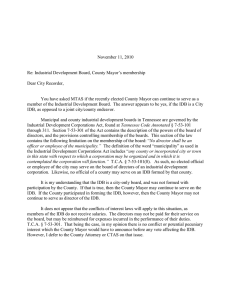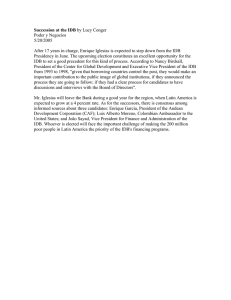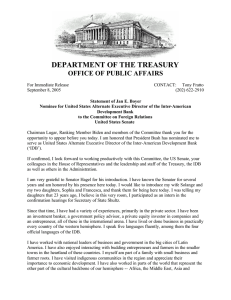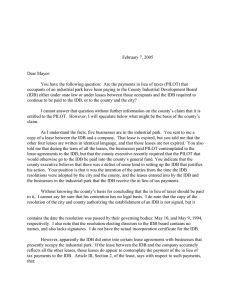January 17, 2003 Dear Mayor:
advertisement
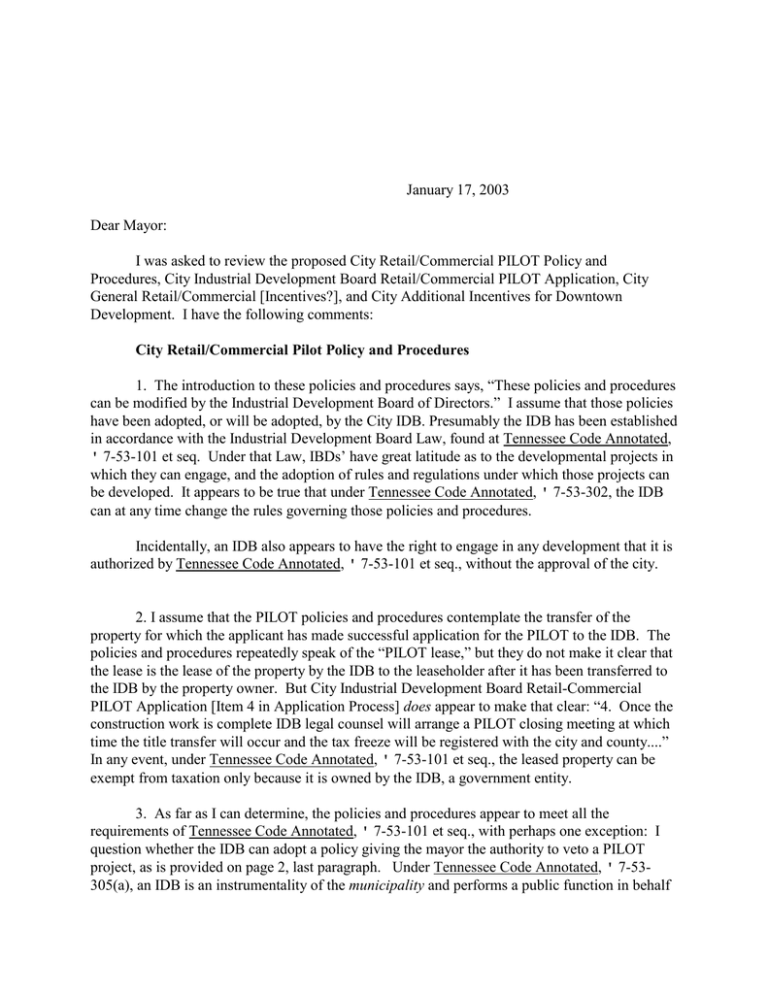
January 17, 2003 Dear Mayor: I was asked to review the proposed City Retail/Commercial PILOT Policy and Procedures, City Industrial Development Board Retail/Commercial PILOT Application, City General Retail/Commercial [Incentives?], and City Additional Incentives for Downtown Development. I have the following comments: City Retail/Commercial Pilot Policy and Procedures 1. The introduction to these policies and procedures says, “These policies and procedures can be modified by the Industrial Development Board of Directors.” I assume that those policies have been adopted, or will be adopted, by the City IDB. Presumably the IDB has been established in accordance with the Industrial Development Board Law, found at Tennessee Code Annotated, ' 7-53-101 et seq. Under that Law, IBDs’ have great latitude as to the developmental projects in which they can engage, and the adoption of rules and regulations under which those projects can be developed. It appears to be true that under Tennessee Code Annotated, ' 7-53-302, the IDB can at any time change the rules governing those policies and procedures. Incidentally, an IDB also appears to have the right to engage in any development that it is authorized by Tennessee Code Annotated, ' 7-53-101 et seq., without the approval of the city. 2. I assume that the PILOT policies and procedures contemplate the transfer of the property for which the applicant has made successful application for the PILOT to the IDB. The policies and procedures repeatedly speak of the “PILOT lease,” but they do not make it clear that the lease is the lease of the property by the IDB to the leaseholder after it has been transferred to the IDB by the property owner. But City Industrial Development Board Retail-Commercial PILOT Application [Item 4 in Application Process] does appear to make that clear: “4. Once the construction work is complete IDB legal counsel will arrange a PILOT closing meeting at which time the title transfer will occur and the tax freeze will be registered with the city and county....” In any event, under Tennessee Code Annotated, ' 7-53-101 et seq., the leased property can be exempt from taxation only because it is owned by the IDB, a government entity. 3. As far as I can determine, the policies and procedures appear to meet all the requirements of Tennessee Code Annotated, ' 7-53-101 et seq., with perhaps one exception: I question whether the IDB can adopt a policy giving the mayor the authority to veto a PILOT project, as is provided on page 2, last paragraph. Under Tennessee Code Annotated, ' 7-53305(a), an IDB is an instrumentality of the municipality and performs a public function in behalf of that municipality. Furthermore, Tennessee Code Annotated, ' 7-53-301(b) provides that: The municipality has the power to delegate to the corporation the authority to negotiate and accept from the corporations lessees, payment in lieu of ad valorem taxes; provided, that any such authorization shall be granted upon a finding that such payments are deemed to be in furtherance of the corporation’s public purpose as defined in this section....The legislative body of the municipality making such delegation may, in its sole discretion, require the corporation to submit any such agreement to such legislative body for its approval. As pointed out above, IDB’s do have broad power to adopt rules and regulations governing development they are authorized to undertake. But Tennessee Code Annotated, ' 753-305 speaks of an IDB as an instrumentality of the municipality, and speaks of a municipality’s delegation to the IDB of its authority to negotiate payments in lieu of taxes, subject to the agreement of the legislative body. That statute suggests that the IDB cannot give the mayor the authority to veto the “PILOT tax freeze.” Moreover, a municipal governing body can delegate its administrative functions, but not its legislative functions, to the mayor or other subordinate officer. For that reason, it may not be possible even for the city to delegate to the mayor the authority to veto PILOTS. My research does not point me to a conclusive determination of whether the municipal governing body’s approval of PILOTS is administrative or legislative, but I lean to the proposition that it is legislative. City Industrial Development Board Retail/Commercial Pilot Application This appears to me to be a simple nuts and bolts application upon which I have no comment. City General Retail/Commercial I gather that this document reflects a mix of the things that the City, the IDB, and other public entities, will do for development that meets the requirements of the City Industrial Development Board Retail/Commercial PILOT Policy and Procedures. 1. This provision calls for the waiver of the electrical deposit and tapping fee of up to $5,000. January 17, 2003 Page 3 I am not sure from where the City obtains its electricity, but as I read the Municipal Code, title 19, chapter 1, the city has granted a franchise to an electrical supplier. If that is so, the City cannot commit the supplier to a wavier of the electrical deposit and tapping fee. More importantly, it is questionable whether such a waiver would be legal no matter what public or private entity provides the city’s electricity. Generally, all inhabitants of a municipality of the same reasonable class are entitled to utility service from both public and private utilities, without discrimination. [City of Parsons v. Perryville Utility District, 594 S.W.2d 401 (Tenn. Ct. App. 1979); J.W. Farmer v. Mayor and Council of Nashville, 127 Tenn. 509 (1912); Watauga Water Co. v. Wolfe, 99 Tenn. 429 (1897), Crumley v. Watauga Water Co., 99 Tenn. 419 (1897).] That is true even if the law under which the utility system is established does not say so. It is difficult for me to conclude that it is reasonable to put one developer in a classification under which his electrical deposit and tapping fee can be waived and another in a classification under which such deposit and fee cannot be waived, based on the difference between how much they are investing in the property, and other variables that apply to the PILOT program. Apparently various payback arrangements between developers and utility systems under which the former front-ends the cost of utility extensions, and over time is paid back that cost from utility revenues, are legal. [See Chandler Investment Co. v. Whitehaven Utility District, 311 S.W.2d 603 (Tenn. Ct. App. 1957); Trull v. City of Lobelville, 534 S.W.2d 638 (Tenn. Ct. App. 1977); Johnson City v. Milligan Utility District, 276 S.W.2d 748 (Tenn. Ct. App. 1955). Also see City of Shelbyville v. State ex rel. Bedford County, 415 S.W.2d 139 (Tenn. 1967); Batson v. Pleasant Hill Utility District, 592 S.W.2d 578 (Tenn. Ct. App. 1980); Maury County Board of Public Utilities v. City of Columbia, 854 S.W.2d 890 (Tenn. Ct. App. 1993).] However, presumably there is no issue of utility extensions in the furnishing of utility services to developers who might qualify for a PILOT. 2. This provision calls for site preparation for new and existing buildings up to $10,000 along public rights-of-way or other public areas. Under Article 2, ' 29, of the Tennessee Constitution, municipalities can expend tax revenues only for “corporation purposes.” It appears to me that Doane v. City of Oak Ridge, 898 S.W.2d 728 (Tenn.Ct. App. 1995), supports the proposition that the expenditure of the city’s tax revenues to improve its rights-of-ways and other public places in connection with private development qualifies as a “corporation purpose.” 3 & 4. These provisions call for low interest loans of up to $15,000, and professional assistance in applying for such loans. It does not appear to me that such loans are to be made by the city. For that reason I will not analyze these two questions. However, I will say that the city probably could not make such January 17, 2003 Page 4 loans (although it can make loans to an IDB. See Tennessee Code Annotated, ' 6-54-118). 4. This provision calls for PILOT’s for building and equipment for up to 10 years. This is a benefit which comes through the IDB, and I assume that the “Criteria for PILOT:” is part of the PILOT policies and procedures. Additional Incentives for Downtown Development 1. The one year chamber membership at no cost is a private benefit. 2. The provision for facade renovation assistance for building owners may pose a legal problem for the city if such assistance is to come directly from the city. 3. Significantly reduced advertising rates with local media is a private benefit. 4. Waiver of City business permit fee for the year of start-up is unquestionably illegal. The business permit fee is a function of taxation. [See Tennessee Code Annotated, ' 67-4-704, and State ex rel. Polin v. Hill, 547 S.W.2d 916 (1977)]. A business tax waiver by the city would violate the well-established rule that taxes must be equal and uniform within a taxing jurisdiction. Sincerely, Sidney D. Hemsley Senior Law Consultant SDH/
